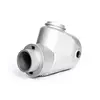Mobile:+86-311-808-126-83
Email:info@ydcastings.com
Advantages and Techniques of Aluminum Gravity Casting in Modern Manufacturing
Gravity casting, a popular method in metalworking, particularly for aluminum, is celebrated for its combination of efficiency and precision. This process involves pouring molten aluminum into a mold under the influence of gravity, leading to castings that are both strong and lightweight. The application of gravity casting in aluminum fabrication offers distinct advantages that make it a preferred choice for many industries, including automotive, aerospace, and consumer goods.
One of the primary benefits of gravity casting is the excellent dimensional accuracy it provides. When molten aluminum is poured into a mold, gravity ensures that it fills the cavity uniformly, reducing the likelihood of air pockets or voids that can compromise the integrity of the final product. This precision is crucial in industries where high tolerances are required, minimizing the need for extensive post-casting machining.
.
Another significant advantage of gravity casting is its versatility in producing intricate designs. The process allows for the creation of complex shapes and features, which are often essential in automotive and aerospace applications. Additionally, gravity-cast aluminum components often exhibit superior surface finishes, enhancing product aesthetics and functionality.
gravity casting aluminium

The environmental impact of gravity casting is another consideration. Since the process utilizes aluminum—a material that is highly recyclable—manufacturers can contribute to sustainability efforts. Recycling aluminum saves energy and reduces greenhouse gas emissions, aligning with global initiatives aimed at minimizing environmental footprints.
Despite its many advantages, gravity casting does come with some challenges. For instance, the process requires careful temperature control to maintain the quality of the aluminum and prevent defects. Furthermore, the initial cost of mold creation can be higher than other methods, posing a barrier for smaller manufacturers. However, these challenges are often outweighed by the overall efficiency and quality achieved through gravity casting.
In conclusion, gravity casting of aluminum is a vital process in modern manufacturing, characterized by its precision, energy efficiency, and versatility. Its ability to produce both lightweight and strong components makes it invaluable across various industries, paving the way for advances in technology and design. As manufacturers continue to seek sustainable and efficient production methods, gravity casting will undoubtedly remain a cornerstone of aluminum processing.
-
Why Should You Invest in Superior Pump Castings for Your Equipment?NewsJun.09,2025
-
Unlock Performance Potential with Stainless Impellers and Aluminum End CapsNewsJun.09,2025
-
Revolutionize Your Machinery with Superior Cast Iron and Aluminum ComponentsNewsJun.09,2025
-
Revolutionize Fluid Dynamics with Premium Pump ComponentsNewsJun.09,2025
-
Optimizing Industrial Systems with Essential Valve ComponentsNewsJun.09,2025
-
Elevate Grid Efficiency with High-Precision Power CastingsNewsJun.09,2025











